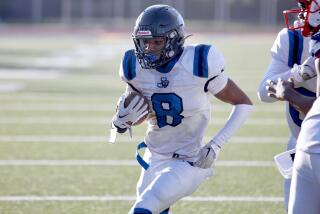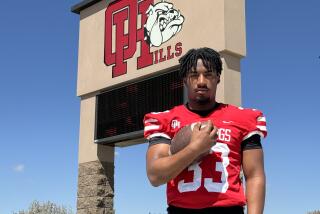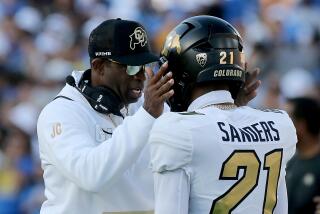The Big Spin
- Share via
MIAMI — The kid was big and fast and talented. And that was part of his problem.
At various times in high school, Dan Cody played free safety and defensive end. Fullback and tight end. He was quarterback too.
So no one knew quite what to do with him, least of all college recruiters. Only a few came calling.
“I felt like I had the ability to play,” he says. “I just didn’t know where it was going to be.”
The short answer: Oklahoma.
The Sooners gambled on Cody and found a way to make use of his many facets. As the designated “spinner” on defense, the 6-foot-5, 270-pound senior moves around before the snap, sliding inside or out, getting down in a three-point stance or backing off to a linebacker position.
This freedom has helped make him an All-American and a player that top-ranked USC must reckon with in Tuesday’s national championship game at the Orange Bowl.
But defensive schemes tell only a small part of Cody’s story. Before he could become a star on the field, he had a more personal battle to fight, finding a place to belong.
“I’ve seen so much ... not just in football but in life,” he says. “You learn about yourself, about your heart.”
‘A Lot of Trouble’
Watching Oklahoma games this season, it is hard to imagine anything slowing Cody down.
“He looks like he’s going to be a lot of trouble,” USC offensive lineman Sam Baker says. “He’s all over the field and you’ve always got to keep your eyes open.”
Big 12 Conference teams learned that the hard way. Cody led the conference with nine sacks and was best on the Oklahoma defense -- ranked ninth in the nation -- with 15 tackles in the backfield.
His success spilled over to teammates along the line.
“As you get your plan together, you have to know exactly where he is,” Nebraska Coach Bill Callahan said last month. “Then you put so much focus on one player ... and they have a tremendous front that feeds off each other.”
The result: Eight sacks for Jonathan Jackson and seven for Larry Birdine, his fellow defensive linemen.
“The other teams pay a lot of attention to Dan,” Jackson says.
That’s a big change from his senior season at the high school in tiny Ada, Okla. Brent Venables, the Sooners’ co-defensive coordinator, laughs when asked about the recruiting war over Cody.
“Us and Duke,” Venables says.
Oklahoma offered a scholarship based on potential.
“We just saw a big, strong, raw-boned Oklahoma boy,” Venables says. “You know those boys are going to end up playing somewhere.”
But where?
On the first day of summer training camp, Cody emerged from the locker room thinking that he was a tight end and dressed accordingly in a red jersey. Coach Bob Stoops stopped him.
“Defense wears white,” Stoops said.
Five months later, the freshman had established himself as a defensive end and had three tackles in the 2001 Orange Bowl as Oklahoma won a national championship with a 13-2 victory over Florida State.
It all happened so fast, he says. Maybe too fast.
Things began to go wrong at the start of the following season. Cody was sleeping too much. Football stopped being fun. He did not feel like a part of the team.
“He was just really sad,” his father, Steve, said. “Didn’t eat. Couldn’t really function.”
After one game, he quit.
“It’s hard to explain,” Cody says. “When I walked away, I thought it was over for good.”
Doctors soon discovered the sophomore was suffering from clinical depression.
The diagnosis startled coaches and teammates who knew Cody as upbeat during games -- he once blacked out while urging his team on from the sidelines -- and relaxed off the field.
Two things happened.
First, he got treatment for his condition. Second, he was drawn back to football for the simple reason of wanting to belong.
“It was the other players and the secretaries on the third floor and the guys in the equipment room,” he says. “When I got on the outside looking in, I missed that.”
The coaches welcomed him back in the spring of 2002. “We just wanted him to be healthy and have a good life,” Venables says.
There were subsequent bouts of depression but, Cody says, “once you go through it the first time, you learn how to deal with it.”
Football helped, his team becoming an extended family.
“We call each other brother. That’s how we are,” Jackson says.
Cody adds: “People became so much closer ... everyone took that extra step to pat me on the back.”
On the Move
This season, Cody has returned the favor, helping the Sooners in their time of need.
Defensive tackle Tommie Harris left school early for the NFL and Dusty Dvoracek, another tackle, was dismissed in September for disciplinary reasons. Oklahoma needed a new star on the line.
Stoops began tinkering with Cody at the “spinner” position in fall practice. Jevon Kearse was used in a similar way when Stoops was the defensive coordinator at Florida in the late 1990s.
The Sooners unleashed Cody in this role against Texas in October. Used mainly in passing situations, it allows him to blitz from the edge, drop back in pass coverage or even line up at tackle.
“We’ve been able to create a lot of mismatches and get Dan isolated,” Venables says.
The USC coaches say they aren’t too worried about Cody moving around before the snap. Of greater concern is what happens after the play begins.
“He’s fast and he does a good job in their scheme,” offensive line coach Tim Davis says. “It’ll be a test for us.”
For Cody, the Orange Bowl marks the end of a career greater than anything he might have imagined back in Ada.
Twice he has been a finalist for the Ted Hendricks Award, given to college football’s best defensive end. Three times he has played in a national championship game.
“It has been an unbelievable ride,” he says. “A lot of players walk away from college football with regrets. I feel like I’ve done everything I could do.”
There is a line from the Shaker hymn, “Simple Gifts,” that goes: “Tis the gift to come down where you ought to be.”
That is how Cody feels.
The high school player who never settled in one position, the college sophomore who wasn’t sure where he fit in, is now exactly where he ought to be.
More to Read
Go beyond the scoreboard
Get the latest on L.A.'s teams in the daily Sports Report newsletter.
You may occasionally receive promotional content from the Los Angeles Times.







